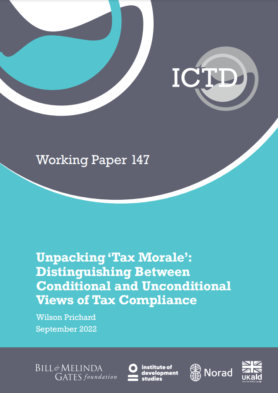Working Paper 147
There is mounting evidence that strengthening tax morale can have important benefits in encouraging quasi-voluntary tax compliance, building political support for reform, and supporting tax bargaining between citizens and governments. However, the literature has been plagued by an often vague, and overly aggregated, understanding of the concept of tax morale. This has consequences for our ability to understand both tax compliance, and the broader connections between taxation and the expansion of accountability in lower-income countries. Drawing on evidence from multiple surveys in sub-Saharan Africa, this paper argues that there is a need, in particular, to clearly distinguish between the more conditional and unconditional dimensions of tax morale. To develop that argument, this paper first illustrates sharp differences in responses to survey measures of tax morale based on superficially small, and common, differences in how the concept is measured. It then shows that these differences follow a clear pattern, linked to the degree to which different measures of tax morale capture more conditional or unconditional dimensions of the concept. Finally, it highlights the practical benefits of this more nuanced understanding of the concept for thinking about tax reform, and the broader character and evolution of fiscal social contracts in lower-income countries.

